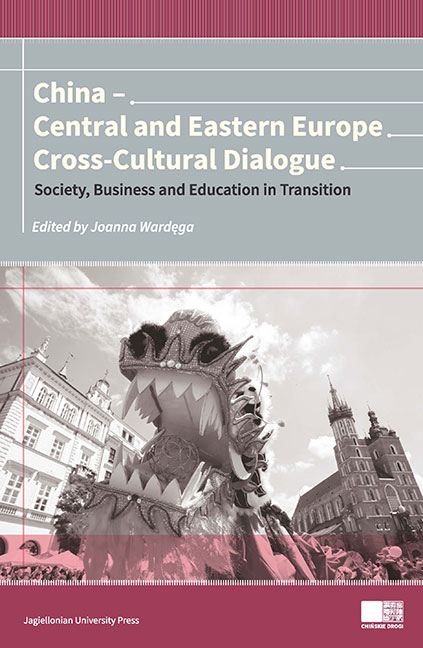Book contents
- Frontmatter
- Contents
- Foreword
- PART I Society and Culture in Transition
- PART TWO Economy and Markets in Transition
- Chinese Economic Influence on the Central and Eastern Europe Countries
- The New Silk Road and its Geopolitical Consequences for Poland
- Comparing Chinese, Japanese and South Korean FDI in Central and Eastern Europe
- Partnership through Investment – Chinese Foreign Direct Investment in CEE Countries
- Chinese Foreign Direct Investments in Europe. The Polish Case
- Fourteen EU States Already in, Japan and USA Still not Interested – What Lies Behind China-led AIIB?
- What Can CEE and China Learn from Each Other in Innovation?
- Comparison of Telecommunications Development Pattern in China and the Republic of Macedonia
- Development of Chinese Mobile Phone Game Market as an Export Opportunity for CEE Mobile Game Producers
- PART THREE Education in Transition
- Contributors
Fourteen EU States Already in, Japan and USA Still not Interested – What Lies Behind China-led AIIB?
from PART TWO - Economy and Markets in Transition
Published online by Cambridge University Press: 22 December 2017
- Frontmatter
- Contents
- Foreword
- PART I Society and Culture in Transition
- PART TWO Economy and Markets in Transition
- Chinese Economic Influence on the Central and Eastern Europe Countries
- The New Silk Road and its Geopolitical Consequences for Poland
- Comparing Chinese, Japanese and South Korean FDI in Central and Eastern Europe
- Partnership through Investment – Chinese Foreign Direct Investment in CEE Countries
- Chinese Foreign Direct Investments in Europe. The Polish Case
- Fourteen EU States Already in, Japan and USA Still not Interested – What Lies Behind China-led AIIB?
- What Can CEE and China Learn from Each Other in Innovation?
- Comparison of Telecommunications Development Pattern in China and the Republic of Macedonia
- Development of Chinese Mobile Phone Game Market as an Export Opportunity for CEE Mobile Game Producers
- PART THREE Education in Transition
- Contributors
Summary
Introduction
The Asian Infrastructure Investment Bank (AIIB) has gained a lot of attention recently, mainly due to the geopolitical context of China's proposal. A newly established development bank has been described by observers as an unprecedented project by a Northeast Asian emerging market with hegemonic ambitions.
The AIIB was proposed by the Chinese president, Xi Jinping, and the prime minister, Li Keqiang, during a series of visits in Southeast Asia in October 2013. Massive interest of both regional and non-regional states in obtaining a Prospective Founding Member (PFM) status, as well as quasi-ostentatious absence of the United States and Japan in the proposed framework, assign an extra meaning to discussions over new financial institution.
The aim of the paper is to study the evolution of Asian financial regionalism through the prism of the China-led Asian Infrastructure Investment Bank (AIIB) in order to understand hegemonic aspirations of Beijing, draw implications of establishment of new financial institution on mega-regional relations between China and Asian and non-Asian prospective founding members of AIIB. The author would like to study China's project addressing the scope of membership, investigating motivations laying behind the decisions of individual states such as the United States, Japan, Australia or the EU countries, including the United Kingdom and Poland. A theoretical context is drawn basing on the theories of financial regionalism and hegemonic stability.
Theoretical frameworks
Financial regionalism
The author would like to address the concept of financial regionalism as proposed by Hamanaka, while indicating lack of cohesive definition of this term.
Following Hamanaka, there are two types of financial regionalism, namely financial or macroeconomic forum or meeting, engaging regional states, and regional financial arrangement, involving two or more states.
The financial forums used to act as platforms for the purposes of regular information exchange between representatives of regional financial authorities. In this context, extra importance is assigned to regional, macroeconomic surveillance forums, gathering various market and fi- nancial data, enabling policy coordination and peer pressure. Such meeting may involve senior, deputy or deputy-deputy level of ministries, as well as directors of national central banks. Noteworthy, involvement of institutional apparatus gives an opportunity for constructive discussion and provision of reliable commitments.
- Type
- Chapter
- Information
- China - Central and Eastern Europe Cross-Cultural Dialogue Society, Business and Education in Transition , pp. 259 - 276Publisher: Jagiellonian University PressPrint publication year: 2016

